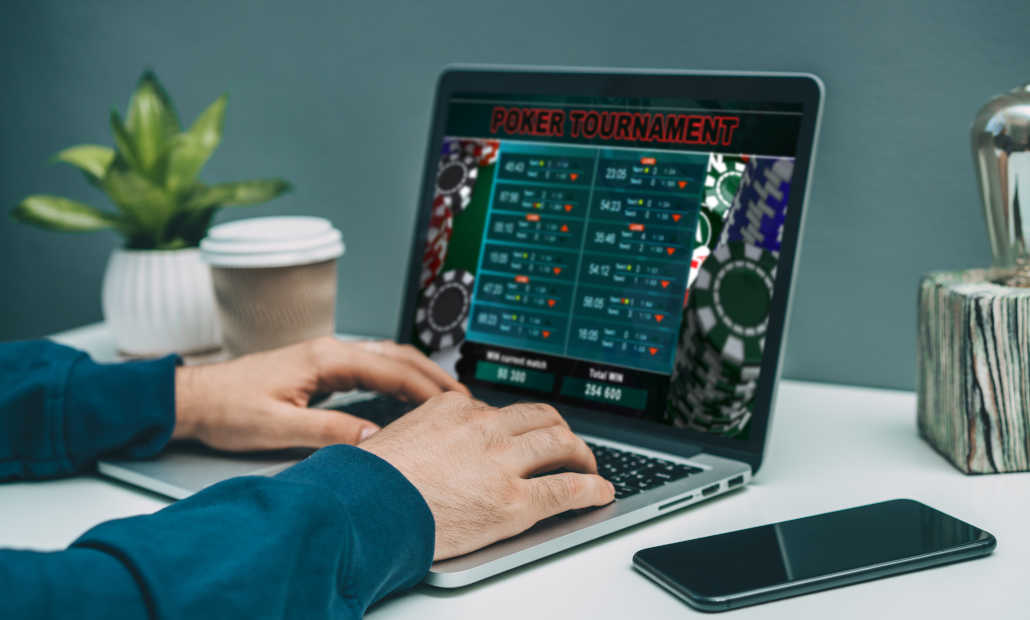Learn Poker Online – How to Study the Right Way

10 minutes
Thanks to the internet, nowadays you have every imaginable poker resource at your disposal. However, this means that your competition has the same.
Because of this, becoming a winning poker player is not about finding resources. It is about finding the right ones and using them correctly.
Today we break down the best way to learn poker online without getting overwhelmed by the information available.
In the first part of the text, we will break down the best way to learn poker online. In the second part, we will focus on the best ways of studying the game.
Learn Poker Online: Where to Start
Okay, so let’s say that you got introduced to poker by your friends or family, or maybe you saw it on TV or the internet, and decided you want to give it a shot.
Before you jump into learning and studying, the first thing you should do is consume as much poker content as needed to get a better understanding of the game.
Online streaming platforms like Twitch and Youtube have a ton of poker content, so you can watch both live and online poker games.

This step is important because if you only played poker in home games, you might have a completely wrong picture of how the game is played. You might not even have clue how to play competitive poker.
Watching poker games online will give you a much better picture of how poker is played in real life and help you decide how serious you are about learning it.
Choosing the Right Poker Games and Formats
Depending on how much time you have for learning poker online, the next step is to decide which poker games and formats you want to learn.
Learning the Right Poker Games
One of the best ways to decide this is to ask yourself what you want from the game. Are you looking just to have fun or do you want to make money?
If you are just looking for a hobby, you should go with poker games that you enjoy playing, but if you want to make money, then your options are more limited.
Most poker players today make a living by playing either No Limit Texas Hold’em or Pot Limit Omaha.
This is a very important step in the process. The last thing that you want to do is learn a poker game with the intention of making money and devote your time to learning it, only to find out that there isn’t enough opposition or enough poker sites offering your game of choice.
Learning the Right Poker Formats
The second thing that you want to decide is what poker format you want to play, i.e. poker cash games or poker tournaments.
This doesn’t mean that you can’t learn both formats in the future. However, focusing on only one will help you dedicate all your time to that format, which will result in learning it much faster.
To decide which format to go with, ask yourself two questions:
- Which format do I like more?
- How much time can I dedicate to playing poker?
If you are not on a tight schedule and you enjoy playing the tournament format, then poker tournaments might be the right option.
On the other hand, if you do not have the luxury of playing long poker sessions (four hours or more), you should probably go with cash games.
Learning the Rules of Different Poker Formats Online
After you decide which games and formats you want to play you should devote some time and learn the rules of the game as well as the rules of the format.
When it comes to the rules, you can download poker e-books, read online articles or watch YouTube tutorials.
Since poker rules are universal, all of the mentioned should contain the same information.
If you played poker before and you know the rules perfectly then you should devote your time to learning the rules of the format you choose to learn.

Although the basic principles of the format usually stay the same, online poker rooms often introduce new games to keep their users interested.
So, when it comes to learning the structures and the rules of different poker formats, our advice is to go with the latest articles and videos on the subject.
Learn Poker Fundamentals Online
Learning the fundamentals in the correct way is the most important step in your poker career. This sets the stage for all the medium and high complex concepts that will come after.
In this stage of your poker learning process, you will want to focus on:
- Positional awareness
- Opening ranges
- Opening and raising sizes
We recommend that you first go through the theoretical part for each of these fundamentals a couple of times to fully understand what each of these concepts means.
You should first read e-books or articles on these subjects and then watch some videos to see how they are applied at the tables.
Applying Basic Poker Principles
After you take the necessary time to fully understand these basic poker principles, the next step is to try and apply them in-game.
Like in all other areas of life, in poker, experience is the best teacher, so you will need to start playing some real money games.
I know that a lot of players that are new to poker might be money scared and, because of this, they start their journey by playing in play money games.
This is totally fine as long as you understand that, while these games have the same rule, they are played in a totally different way as there is no monetary incentive.
Don’t expect players in real money games to play the same way, as this might cost you even more money.
Our advice is to use some of the money that you need for living expenses to create a poker bankroll and start playing the lowest games that will not have a financial impact on your life.
Players in these games play much more seriously so this experience will be much more valuable for your poker career.
You should repeat this process each time you are trying to learn something new about the game of poker.
How to Study Poker the Right Way
The first thing that you need to realize is that you won’t become great overnight. As with everything else in life, developing exceptional poker skills requires time and dedication.
Creating a Study Plan to Learn Poker
One of the keys to creating a successful poker career is creating a plan for studying.
The plan for studying poker should include:
- How much of your time you are willing to invest
- What poker concepts do you want to study
Write down the answers to these questions for each of your study sessions and input it into your calendar.
If you are not sure which areas you should focus on, ask yourself these questions:
- What segments of my game do I need to improve?
- Will improving in these areas have a big impact on my win rate?
If you don’t have an answer to these questions, you have a couple of options:
Take some of the poker hands in which you were not sure what to do, post them on a poker forum like 2+2, and ask other players for advice.
Just make sure you take advice only from members that have a proven track record.
If you don’t have a hand history or any saved hands, keep playing and write down every hand in which you are not sure what to do.
The second option is to ask a poker friend to help you by either looking at your hand histories or telling you about the most common spots where players of your skill level make mistakes.
Researching & Preparing Poker Concepts to Study
After you decide what poker concepts you want to study and how you want to study them, it is time to research and prepare.

One of the best ways in which you can prepare is to read the materials available online. This will help you have a good understanding of how what the concept actually means, how important it is, and how improvements in this area will improve your overall game.
Depending on the subject, there might be some instructional videos available online on how to study it.
Poker players and coaches often release this kind of content for free to show aspiring poker players what they can expect from their poker training site or poker training course.
Just remember to take notes and watch the video a few times if necessary. A good approach would be to write down each of the steps shown in the video so that you can follow them when it is time to study on your own.
How to Study & Learn Poker Online – Example
Now that we have covered all of the steps necessary for a successful poker study session, let’s look at how you can apply them.
Let’s say that based on your previous performance at the tables, you have decided that you need to work on your c-betting game. So, how will you approach a study session about c-betting and get the best out of it?
The first thing you want to do is book this session into your calendar. We would recommend that you do this at least 7 days in advance if you don’t have access to your hand history.
This way, you can write down all the c-betting spots where you weren’t sure what to do in your upcoming sessions.
The second step is to research the subject. Even if you are well aware of what the concepts mean, we would recommend that you go back and read a couple of articles about c-bets geared toward beginners.
You might think this is a waste of time. However, there could be some useful information that you simply forgot and need reminding of.
Watching the Training Content
After this, it is time to look at some instructional videos about c-bets that cover the most important angles of this concept. There is a lot of free material on Youtube about the subject so you can look there.
YouTube video checklist:
- Make sure that the video is from a reputable authority (you can Google the person that made the video if you are not sure).
- Make sure that the video covers basic and intermediate concepts. You don’t want to immediately jump into advanced c-betting concepts, as this could have an opposite effect on your game.
A good approach would be to first watch a video about c-betting theory. Then, watch a video in which the instructor shows how you should apply the theory in practice.
Also, if you have any questions don’t hesitate to ask questions in the comment section. Discuss them with your friends or post them on a poker forum.
Reviewing Your Own Hands
After you feel you have a good understanding of the basic c-betting concepts it is time to review some hands.
The ideal scenario would be that you have either Hold’em Manager or Poker Tracker. In this case, filter your database by the hands you played that reached the turn (so that it includes hands that saw flop action).

If you don’t have any tracking software or if the site you are playing on does not support HUDs, use the hands that you wrote down. Put them into one of the free software solutions available online. This will allow you to visualize the hand and the action.
When reviewing your hands, try not to base your thinking on the outcome. There will be spots in which you made the correct decision and lost and vice versa. Thus, focusing on results alone can be detrimental to your games.
Your end goal should be to learn how to think about different spots in the right way.
Every time you are reviewing a hand, ask yourself what was the logic behind all the actions you took in that hand.
You can then compare the logic you used with the logic from the articles and videos to see if you are on the right path. If you are not sure about interpreting certain spots, ask a poker friend, post a question on a forum, or read some more.
Remember, poker is all about making incremental but consistent progress, so don’t get discouraged if you don’t see the results right away. With enough time and effort studying the game, you’ll get to where you want to be!
- Poker Squeeze Play – Which Hands Make the Most Sense for Squeezing? - August 10, 2023
- How to Play Low Pocket Pairs in Texas Hold’em - July 29, 2023
- How to Make Deep Runs in MTTs More Often - July 22, 2023















